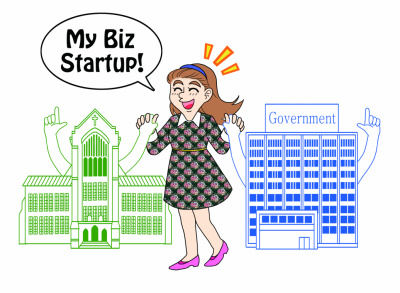Students now permitted to take time off for up to four semesters

The Five Year Plan and the Eight Big Tasks are the government’s approach to change society’s negative outlook on students setting up a business and make up the quantitative and qualitative education these students have missed, which hinders their startup spirit.
With the announcement of the Five Year Plan, a new team called the Creative Economy Promotion Division was officially established in the MSIP on Sept. 12. The team will mainly promote and help startups in Korea as a whole, from university students to small and medium-sized businesses. The team will also develop policies to enhance university startups.
“We will follow the tasks we set to enable the Five Year Plan to come into effect,” said Park Sung-kook, an official of the Creative Economy Promotion Division in the MSIP. “At the same time, however, we will keep on researching to extend those ideas and develop new ones.”
The Eight Big Tasks comprise expanding and enriching startup education, providing a startup-friendly undergraduate system, strengthening professionalism among startup officials, providing an atmosphere for students to meet the challenge of startups, supporting students’ startup endeavors, inducing universities to support student startups, strengthening the startup capacity of universities in regional areas and providing a startup-friendly atmosphere in general.
The government is working on specific plans to achieve these eight tasks. They include taking time off from school for the startup system’s startup credit admission system, a startup credit-exchange system and giving incentives to universities that have excellent startup capacity.
In order to prevent students from quitting school or stopping their pursuit of academics, the government has provided them extra time. In contrast to previously allowed three semesters, students can now take off a maximum of four semesters.
As another way to minimize students’ academics being interrupted by their business startups, the government will encourage universities to give credits to students for setting up a business if it is in accordance with achieving the purpose of studying. This applies to students participating in business startup clubs or Capstone Design, a program in which university students attempt to solve difficult technical problems for companies by doing the whole process on their own from planning and designing to carrying out the actual projects. After students complete these activities, professors will evaluate those activities and determine whether or not to give the credits.
Furthermore, the startup credit exchange allows students to take courses related to startups in other universities and to get credit for such courses.
The government will also financially encourage universities to help provide a business-startup-friendly atmosphere. When evaluating schools before granting financial support, the government will also judge an index that reflects the university’s startup education so that universities can give more attention to startups. By measuring the index, the government will choose universities that have great startup capacity.
Students intending to undertake startups are satisfied with the government’s plan.
“I have always wanted to set up my own business,” Pak Seong-dong (Korea University, 4) said. “However, I did not know where to start because there is no atmosphere supportive of student startup. I believe these changes will give mental support to students like me.”
Ahn In-kyeong
iahn@ewhain.net

